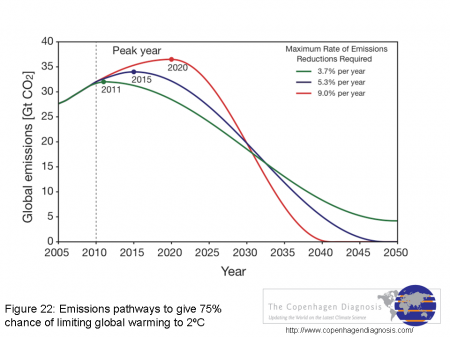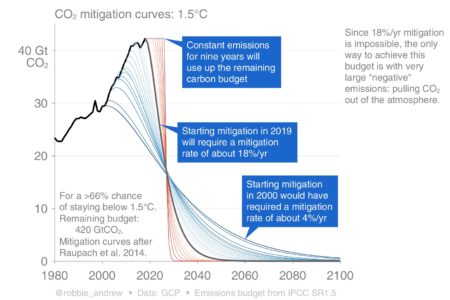This chart is a nice demonstration of what a pragmatic all-bases-covered campaign against climate change might encourage or at least contemplate pic.twitter.com/D6YONNjebN
— Milan Prazak Ilnyckyj (@sindark) June 6, 2019
Category: Politics
All posts on what Bismarck called “the art of the possible”
Delaying climate action is the most expensive thing we will ever do
Figure from my 2009 blog post, showing why delaying the global peak year for greenhouse gas pollution emissions means having to cut emissions much faster in the 2020s and 2030s to achieve the same temperature target:
Tweeted by Greta Thunberg today:
All this delay mutually reinforces the risks of catastrophes. People keep investing in fossil fuels, so they have more to lose from decarbonization. We keep putting off emission cuts, meaning that their eventual rate will need to be much more draconian than if we had started promptly when the risk of catastrophic climate change became well-recognized in the 1990s. We’re committing ourselves to more severe climate change effects, meaning more forced relocation, severe droughts, extreme weather events, and adaptation costs in general measured in both wealth and lives. We’re missing the chance to build global cooperation and overcome the parochial one-country-mindset mentality that makes global environmental problems into collective action problems.
B.C. Court of Appeal on Trans Mountain
UBC political science professor George Hoberg has a post about today’s court ruling saying B.C. can’t restrict bitumen transport through the proposed Trans Mountain pipeline expansion: The BC pipeline reference case in context
Recent news story on fossil fuel divestment at U of T
Where have all the activists gone?
The Varsity
By Anna Osterberg
Published: 7:28 pm, 17 May 2019
Nathalie Des Rosiers appointed new Principal of Massey College
Yesterday the Massey College Governing Board announced that they have selected Hugh Segal’s successor as the head of Massey College. Their message says: “Massey College is delighted to welcome Nathalie Des Rosiers as its new Principal. She is a distinguished scholar and respected leader who, throughout an impressive career, has shown a deep respect and understanding of the academic community and a profound interest in the development of graduate students and young scholars. She will bring to Massey a fine mixture of intellectual seriousness, curiosity about the world, and a sense of fun and community.”
The college has posted a biography.
Bank of Canada warns of climate change financial risks
In their 2019 Financial System Review the Bank of Canada identifies assessing climate-related risks as an activity they have started to undertake.
The CBC reports: Climate change threatens ‘both the economy and the financial system,’ says Bank of Canada
Trump and conflict with Iran
This week’s Economist is reporting about the growing danger of armed conflict between the United States and Iran:
- The brewing conflict between America and Iran
- As America and Iran act tough, the risk of conflict is growing
President Donald Trump’s fixation with undoing “Barack Obama’s signature diplomatic achievement” in the form of the Joint Comprehensive Plan of Action (JCPOA) nuclear deal was worrisome and counterproductive enough, in a world where nuclear weapon proliferation is a growing threat and where proliferation in the Middle East is especially likely if any new nuclear weapon powers emerge.
It’s terrifying to think what a new profusion of nuclear powers in the region could mean. Among other things, I think it would greatly increase the risk of accidental or unauthorized use of nuclear weapons. There were enough US-Soviet close calls in the Cold War, and that was two powers that were far apart, in communication, and well-informed about each other’s capabilities. A nuclear crisis among a larger set of tightly-packed states is a truly fearful prospect.
A conventional American or Israeli attack on Iran is also a fearful prospect, and one that seems almost certain to be less effective at curtailing Iranian nuclear ambitions in the medium term than multilateral diplomacy. Again Trump’s recklessness and the incompetence and ideological drive of his officials like John Bolton is threatening the peace of the world, such as it is holding up these days.
Self-denial as a virtue
Perhaps a central virtue for the world of the future will be self-denial, and specifically channeling covetous feelings toward sustainable ends: not collecting 10,000 Barbie dolls or flying into low Earth orbit, but doing instead things that will enrich and distinguish you in the community without heavy ecological effects, like writing, making art, and theatre.
The importance of self-denial extends beyond avoiding the appetites which John Borrows described in “Seven Generations, Seven Teachings: Ending the Indian Act”: “Our windigo stories strongly teach the consequences of self-destructive cannibalistic consumption. Individuals and entire communities can be eaten up by those possessed by unrestrained appetites”
For instance, self-denial is central to data and network security: splitting up information into compartments, designing trust systems that don’t rely on the assumption that people will act well or that one person should have all the control, even choosing passwords too complex to remember yourself.
We may need to deny impulses of all sorts: the desire to travel, the desire to maintain close personal relations through in-person contact, the spendour and variety of what our erosive capitalist society provides. I considered “corrosive” to take advantage of the consonance, but “erosive” is really the right word: we have a global system of production and consumption that eats away at the material adjacent to it, breaking it apart and moving it like a riverbank getting eroded.
We need to learn to live so that erosive process comes into balance with what the planet can survive, and crucially do so through a global project of decarbonization with the necessary scope and ambition to keep warning anywhere near 2 ˚C above pre-industrial levels.
Scheer Conservatives and climate
Quebec floods
This Montreal Gazette story opens with a line which I expect will become increasingly commonly heard as climate change impacts worsen: “Premier François Legault said Sunday it might be necessary to force people in flood zones to move away to avoid taxpayers having to constantly pay to repair their homes.”
That seems sure to be one of the big sources of disruption: people living in especially vulnerable places, getting hit over and over by extreme weather, and facing pressure to relocate, all while feeling put out and entitled to keep living as they did before.
People who currently profit from fossil fuels want compensation if they are forced to stop, and people suffering the consequences of fossil fuels want compensation for their losses. The anonomyzing gulf between emissions in one place and impacts in another threaten to leave everyone unsatisfied. Meanwhile, more and more places whose habitability we have taken for granted may become unlivable as storms worsen, sea levels rise, and water scarcity gets harsher.


